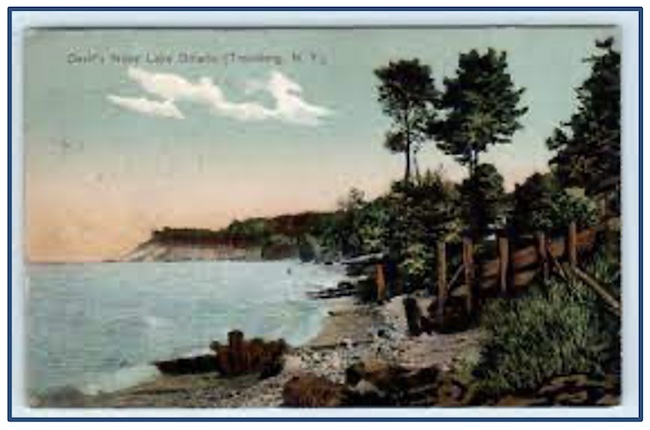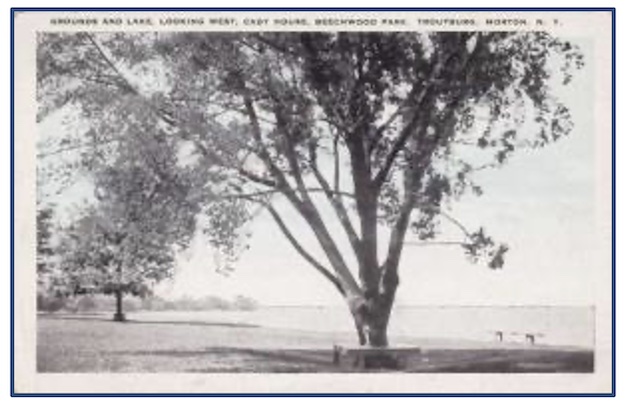Secluded site at Troutburg was often bustling with illegal activity
Kendall location by lake hosted bare-fisted boxing, ‘rum-running’

Postcard view of the quiet beach at Troutburg in Kendall.
By Catherine Cooper, Orleans County Historian
Illuminating Orleans, Vol. 2, No. 24
KENDALL – The Lure of the Illicit!
The Troutburg beach area, in the northeast corner of the Town of Kendall, was a popular destination for city-dwellers seeking relief from the heat of the summer months. The factors which contributed to its popularity as a summer resort: quiet secluded cove, rural area, proximity to transportation, also made it an attractive location for more nefarious activities.
Bare-fisted prizefighting was an illegal but popular sport in New York State from the pre-Civil War days until 1920 when the Walker Act legalized professional boxing.
On the night of August 23, 1885, two steamers carrying a contingent of fight enthusiasts, left the Port of Rochester and set out for Oak Orchard to attend a fight between Patrick Slattery of Rochester and William Baker of Buffalo.
However, when they arrived at Oak Orchard there was no sign of activity. Acting on a tip-off, Sheriff Howard of Albion had arrested both men. They were arraigned in Albion on a charge of conspiracy to engage in a prize fight but were released on $400 bail.
Undaunted, the organizers regrouped and soon set off aboard another steamer with the two hundred or so men who had each paid $5 to see this fight. Their new destination was Troutburg, where a tent had been hastily erected at Cady Grove. The fighters stepped into the ring at 4:48 p.m. that afternoon and the fight began. It lasted six rounds. Slattery was declared the winner on a controversial decision. Once the fight was over, the crowd quickly scattered.
Baker and Slattery were later arrested, fined $500 each and sentenced to a year in the Monroe penitentiary by Judge Morgan. Their counsel, Mr. Chamberlain, requested clemency and said that the men had been “tools in the hands of others.”
During Prohibition, “rum-running” was a regular activity along the mostly isolated south shore of Lake Ontario as enterprising men sought to profit from quenching the thirst of their clients. Boats laden with Canadian beer slipped in and out undetected, under cover of darkness.
Six Men Held in Two Liquor Hauls: Troopers Find Goods Reported Landed at Troutburg
This headline, which appeared in the Rochester Democrat & Chronicle of July 7, 1924, summarized the events which unfolded after Troop A State Police in Batavia received word of the landing of a boat in Troutburg. The boat had been unloaded and had left by the time the State Police arrived, but they 2,000 cases of Canadian ale valued at $40,000, hidden in a barn in a farm in Morton. Two trucks loaded with ale, which were about to be driven to Rochester, were also seized. Four Rochester men were arrested in connection with this haul. They were held at the Genesee County Jail in Batavia on charges of transporting intoxicating liquor.
Another dramatic event occurred in Troutburg later that summer. The Democrat and Chronicle reported that in August, two musicians who were employed for the summer at the Ontario Hotel left one Sunday afternoon with two 17-year-old girls from Brockport. A search was quickly organized, a reward of $200 was offered. The four were located in Detroit a week later. The two musicians were charged with corrupting the morals of minors. “Friends of the girls expressed the belief that they had eloped with the musicians while their mothers claimed they were abducted.”
Why not take a drive to Troutburg and savor the history in the air?

This quiet beach scene in Troutburg was once the site of much activity.






























































